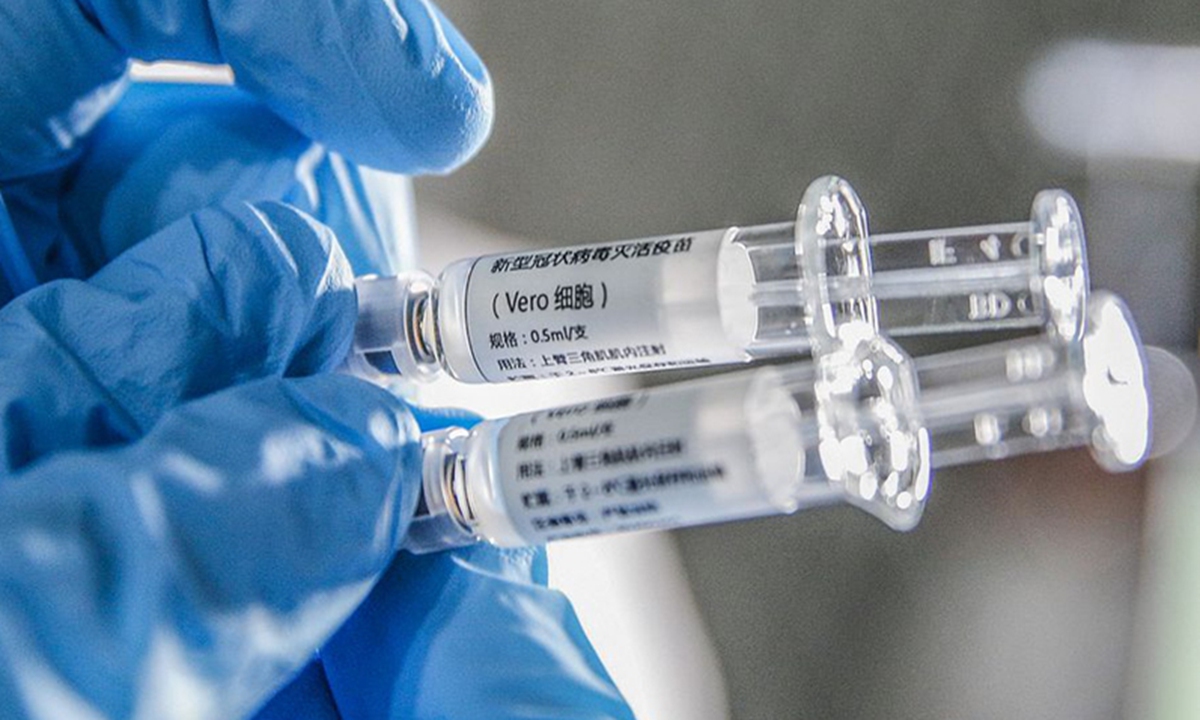Diplomats from countries in the Association of Southeast Asian Nations (ASEAN) and representatives have acclaimed China's COVID-19 vaccines, expressing their confidence in promising results and expectations for further cooperation.
By Hu Yuwei in Nanning Source: Global Times Published: 2020/11/29 20:51:00

Diplomats from countries in the Association of Southeast Asian Nations (ASEAN) and representatives have acclaimed China's COVID-19 vaccines, expressing their confidence in promising results and expectations for further cooperation. The praise contrasts sharply with some Western media claims that Southeast Asian countries have distanced themselves from "China's vaccine diplomacy" due to their national interests potentially being compromised as a quid pro quo for accessing the vaccine.
Representatives from ASEAN members have applauded China's determination to make the vaccines an "accessible and affordable" public good at the 17th China-ASEAN Expo and China-ASEAN Business and Investment Summit held in Nanning, South China's Guangxi Zhuang Autonomous Region. The event ends on Monday.
Chinese President Xi Jinping pledged on Friday at the Expo to actively consider "the needs of ASEAN countries" once the vaccines are available. Xi said that China and ASEAN countries will step up information sharing and cooperation on the production, development, and deployment of vaccines.
As media hyped some deals made by ASEAN members Thailand, the Philippines and Malaysia on Friday for vaccines from the UK and the US, with the biased conclusion of a "major setback to China's devious vaccine diplomacy," China indeed started earlier to work with some ASEAN members in developing vaccines.
Experts said that it is a common practice for a country to secure vaccines from various providers and there is no need to politicize this natural process.
China has promised a prioritized vaccine supply to some ASEAN members with spiraling COVID-19 caseloads and economic stagnation such as five Mekong River countries and the Philippines.
Myanmar Ambassador to China Myo Thant Pe singled out China's vaccines for praise during a press meeting on Thursday, saying that "the covalent vaccines developed in China are global public goods, which are very much appreciated."
"We wish to express our sincere thanks … to the Chinese government for its attitude on vaccine development," Myo Thant Pe told the Global Times.
Malaysia's Deputy Minister of International Trade and Industry Lim Ban Hong has pinned his hopes on Chinese-developed vaccines for a vital accelerator to boost the regional economy, saying the vaccines will create a safer environment for a regional economic recovery across Southeast Asia.
Malaysia has been listed as one of the countries to be given priority to receive vaccines from China, for which Prime Minister Tan Sri Muhyiddin Yassin expressed his appreciation.
Indonesia has also closely worked with Chinese company Sinovac on co-developing an inactivated COVID-19 vaccine in the current Phase-III clinical trials involving more than 1,620 volunteers in Jakarta.
Indonesia feels confident of the safety and efficacy of China's vaccines, Dino Kusnadi, the Indonesian Embassy's deputy chief of mission, told the media at a sideline seminar on China-ASEAN medical cooperation held during the EXPO.
Indonesia has sought emergency authorization to start a mass vaccination campaign by the end of the year, Reuters reported in mid-November. If approved for general use, the Sinovac vaccines would be produced domestically by Indonesia's state-owned pharmaceutical firm PT Bio Farma, the Bangkok Post reported.
Bilateral cooperation on vaccines follows a stable and transparent path, said Dino Kusnadi, adding that Indonesia stresses vaccine safety as a top priority while expecting an affordable price.
Similarly, Laos health minister Bounkong Syhavong expects to facilitate medical exchange with China to quickly find a successful vaccine as a panacea against the virus.
China's vaccine pledges, following assistance in earlier days for masks and ventilators for its neighboring countries, demonstrate that the nation has taken a responsible role in its ties with ASEAN members, analysts said.
Despite evident bullish voices from the ASEAN countries, some Western and Japanese media tagged China's offer as "attempts to develop a COVID-19 vaccine" and a "geopolitical weapon" for "strategic gain in Southeast Asia."
The claim has been criticized by Chinese diplomats and the Chinese Foreign Ministry for its biased interpretation and political intention.
The Foreign Ministry has emphasized that China will not seek to establish a monopoly on vaccine supply.
Ruan Zongze, executive vice president at the China Institute of International Studies, denied the slander of Chinese vaccines with political strings attached, saying that similar offers and pledges were also announced for many African and Latin American countries where China has little room to exchange for political strategic gains.
Such intentional misrepresentation likely stems from the purpose of destroying mutual trust and damping confidence in vaccine cooperation between China and ASEAN.
"What really matters to China is to support fair vaccine distribution for underdeveloped regions in an altruistic effort, as what it aims to achieve in joining the COVID-19 Vaccine Global Access (COVAX) Facility led by the World Health Organization ," Ruan said.
https://www.globaltimes.cn/content/1208409.shtml